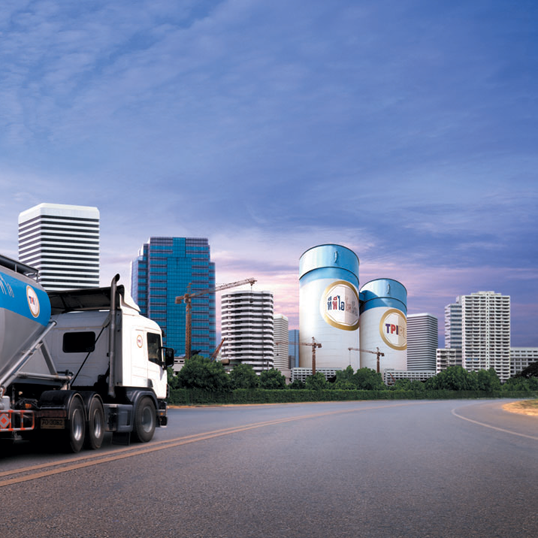
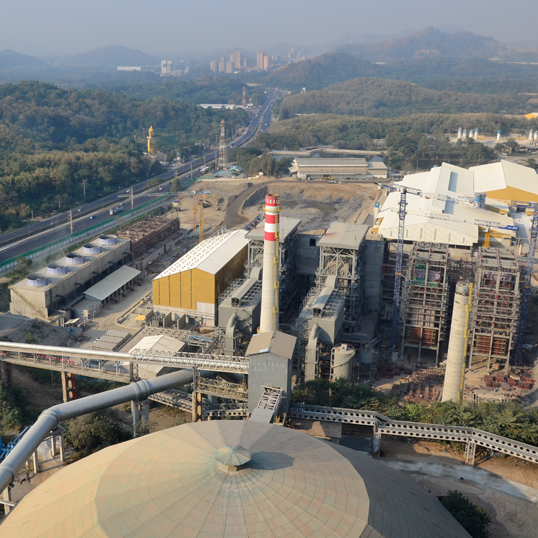
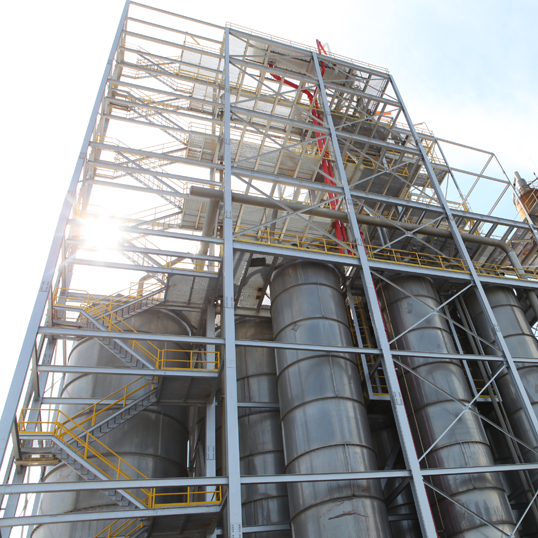
Cement, Clinker and Mortar Cement Business
TPI Polene is one of the major manufacturers and distributors of cement products and mortar cement under the brand name “TPIPL”. The plants are located in Saraburi province. All the Company’s cement products meet the ISO/TIS certifications of industrial standards, ASTM Industrial Standards and the EU Industrial Standards. TPI Polene was the first cement manufacturer in Thailand to be awarded ISO 9002 Certification from the International Standard Institute, for surpassing industrial and environmental protection standards. This has enabled the Company to export cement to the state of California, where surrounding communities are highly aware of environmental conservation.
TPI Polene was also the first cement manufacturer to be awarded the Carbon Label for both Portland cement and the mortar cement products. The Carbon Label demonstrates that the producer has submitted data to show that it has significantly reduced carbon dioxide (greenhouse) emissions, which cause global warming.
The Company currently operates four cement production plants with total production capacity of 13.5 MTPA (Cement line 4 become commercially operational in early 2016), using technologically advanced machinery, and is strategically located, adjacent to both a limestone quarry and an efficient transportation distribution network, which reaches throughout the country. This gives the Company its low-cost competitive advantage. Besides, TPI Polene Group operates Waste Heat Recovery Power Plants, which generate electricity from waste heat emitted from TPI Polene’s 4 cement production plants and/or uses Refuse Derived Fuel (RDF) as fuel to generate electricity in its RDF-fired power plants. As a result, TPI Polene Group become a power plant operator in Thailand, with the largest waste-to-energy power plant operations in the country, a renewable energy to enhance environment.
Cement Industry
In 2015, cement demand in the country was 31 million tons, decreasing from 35 million tons in 2014, or a decrease of 11% as a result of the economic deterioration in the country and drastic slumps in agricultural product pricing, including rice and rubber. However, cement demand consumption in the country in 2015 decreased compared to 2014, mainly due to the slowdown of government infrastructure projects and private construction projects. However, in 2015, Company has consistently developed new cement products as a way to create added value. New products have been launched and introduced to the market, such as Lightweight concrete blocks (ACC type), Digital Board and products for fine art., etc.
Demand growth for cement and clinker as well as other products of TPIPL grew consistently in the export market, in parallel with expansion in the construction sector in Asia, which is mainly the export market that constantly consumes cement and other construction materials in large quantities, particularly by the development of large-scale investments in infrastructure construction in those countries.
In 2016, the Company anticipates that cement demand in the domestic market will increase, supported by investment in public utilities and telecommunication development systems in both the public infrastructure and state enterprises’ on-going investment scheme. In preparation for the ASEAN Economic Community, the Thai government will launch a pilot project to set up “Special Economy Zones” as announced by the government, such as the district in Amphur Maesort, Tak province, Amphur Aranprathet, Sakaew province, Amphur Kongyai, Tak province, Amphur Muang, Mookdaharn province and Amphur Sadao, Songkha province.,etc. All those factors have a direct impact on overall economic growth and demand for cement in the domestic market.
Power Plants
TPI Polene Power Co., Ltd. (99.99%-owned by TPI Polene) made investments in Power Plants with a total capacity of 18 MW each.
- A waste heat recovery power plant (the “WHRPP-40MW”), which generates electricityfrom waste heat emitted from TPIPL’s cement production plants and has an installed powergeneration capacity of 40 MW, consisting of two 20 MW power generation units. These RDF-fired Power Plants have been granted promotion certificates from the BOI.
- An RDF-fired Power Plant with an installed power generation capacity of 20 MW. TPI Polene Power Co., Ltd. began to sell a contracted power generation capacity of 18 MW in January 2015 to The Electricity Generation Authority of Thailand (EGAT). The RDF-fired Power Plants receive an adder of Baht 3.50 per kWh, which is payable in addition to the standard price of EGAT, on alternative-fuel-generated electricity for 7-year period, from EGAT. These RDF-fired Power Plants have been granted promotion certificates from the BOI.
- An RDF-fired Power Plant with an installed power generation capacity of 60 MW. In August 2015, TPI Polene Power Co., Ltd. began to sell a contracted power generation capacity of 55 MW from RDF-fired Power Plant with an installed power generation capacity of 60 MW to The Electricity Generation Authority of Thailand (EGAT). The RDF-fired Power Plants receive an adder of Baht 3.50 per kWh, which is payable in addition to the standard price of EGAT, on alternative-fuel-generated electricity for 7-year period, from The Power Electricity Authority of Thailand. These RDF-fired Power Plants have been granted promotion certificates from the BOI.
- A power plant with an installed power generation capacity of 100 MW, consisting of a 30
MW waste heat recovery power generation unit and a 70 MW RDF-fired power generation
unit, which commenced commercial operations in February 2016. Presently, TPI Polene Power Co., Ltd. has completed the construction of a Waste Heat Recovery Power Plant with an installed power generation of capacity of 30 MW, which will initially sell electricity generated from the waste heat recovery power generation unit to TPIPL to be used in TPIPL’s cement production process until the RDF-fired power generation of capacity of 70 MW becomes commercially operational. Thereafter, a RDF-fired Power Plant with an installed power generation capacity of 100MW will sell a contracted power generation capacity of 90 MW to EGAT in the first quarter of 2017, both of which have been granted promotion certificates from the BOI, which entitles it to a number of benefits including tax exemptions.
- An RDF-fired Power Plant with an installed power generation capacity of 70 MW with total project investment of Baht 3,300 million. The project is currently under construction and is expected to be completed by the end of 2016. TPI Polene Power Co., Ltd. will sell a contracted power generation capacity of 90 MW from RDF-fired Power Plant and a Waste Heat Recovery Power Plant with an installed power generation capacity of 30 MW and 70 MW respectively to The Electricity Generation Authority of Thailand (EGAT) within the first quarter of 2017. (We are currently in the process of signing the contract with EGAT and have already received the acceptance letter from EGAT on November 21, 2015). The Power Plants receive an adder of Baht 3.50 per kWh, which is payable in addition to the standard price of EGAT, on alternative-fuel-generated electricity for 7-year period, from The Power Electricity Authority of Thailand. These RDF-fired Power Plants have been granted promotion certificates from the BOI.
- A coal/RDF-fired power plant with an installed power generation capacity of 150 MW, with the investment project of Baht 7,300 million. The project is currently under construction and is expected to commence commercial operations in the fourth quarter of 2017. The electricity generated from a coal/RDF-fired power generation unit will be sold to TPIPL to be used in TPIPL’s cement production process. This coal/RDF-fired Power Plant has been granted promotion certificates from the BOI.
- A coal and RDF-fired power plant with an installed power generation capacity of 70 MW, with the investment project of Baht 900 million. The project investment was made in 2015 and is expected to commence commercial operations in June 2017. The electricity generated from a coal/RDF-fired power generation unit will be sold to TPIPL to be used in TPIPL’s cement production process. TPI Polene Power is in the process of filing an application to receive promotion certificates from the BOI.
Polene Solar® Products and VAE Copolymer Emulsion and Redispersible Powder
TPI All Seasons Co., Ltd. (99.99%-owned subsidiary of the Company) is the manufacturer and distributor of EVA film that is used for encapsulant for photovoltaic (PV) modules, which are ideal for crystalline, amorphous thin film solar panels. In addition, EVA can be used in laminated safety glass, wrap film, top sheet masking film, multi-purpose plastic sheet, anti-slip mat applications under the brand names of Polene Solar® and Vistasolar® which are certified by Thai Industrial Standards Institute (TIS 9001-2552) and the International Standard Organization (ISO 9001:2008). TPI All Seasons presently operates 10 production lines with an annual capacity of 20,100 TPA (85% from Vistasolar snd 15% from Polene Solar®).
1) Polene Solar® plant with total production capacity of 3,100 TPA 2) Vista Solar® plant with total production capacity of 17,000 TPA. The project as above has been granted promotion certificates from the Board of Investment (“BOI”).
TPI All Seasons Co., Ltd. has also developed and launched VAE copolymer emulsion, which is widely used as adhesives for distribution, the main raw material of which are ethylene and vinyl acetate. It is classified as the green product. Also, the Company has developed and launched re-dispersible powder into the market.
Polene Solar® Products can be classified according to their components and application as follows:
- EVA encapsulant for Photovoltaic (PV) modules.
The encapsulant is very important for the solar module because it is used to fix all components of the modules together. Moreover, the EVA sheet must be robust and protect the solar cells against UV light and moisture for at least 25 years.
- Polene® Solar Film: In 2007, TPI All Seasons created the first EVA products by using high technology in collaboration with Thailand’s top-tier PV manufacturers and our R&D team, who have over 10 years of experience in polymeric materials. The product exhibits very outstanding properties such as high light transmitting, UV protection, excellent adhesion to glass which is suitable for various solar panels (crystalline and amorphous thin film) in order to meet the demands of domestic customers and the Indian market. Moreover, the company has also developed the EVA film for laminated safety glass and decorative ones.
- Vistasolar ®: The most prestigious and oldest brand of EVA film in Europe has been purchased by TPI All Seasons Co., Ltd. in 2014. All machinery, equipment and its technology have been transferred to be installed Thailand. For this reason, the company has gained more market share and has become more well-known in the world market.
- Blown film products
Blown film extrusion is a well-known technology that is the most common method to make
plastic films, especially for the packaging industry (wrap film, top sheet and masking film).
The company also developed the plastic curtain used for cold rooms and clean rooms.
- Anti-slip mats
Polene EVA film can be used as a household multi-purpose plastic sheet such as anti-slip mats or surface protective film in the kitchen, living room and bathroom.
In 2015, TPI All Seasons Co., Ltd had the following total revenues: 75% from EVA encapsulant film, 14% from Blown film products and 11% from anti-slip mat and multi-purpose plastic film respectively.
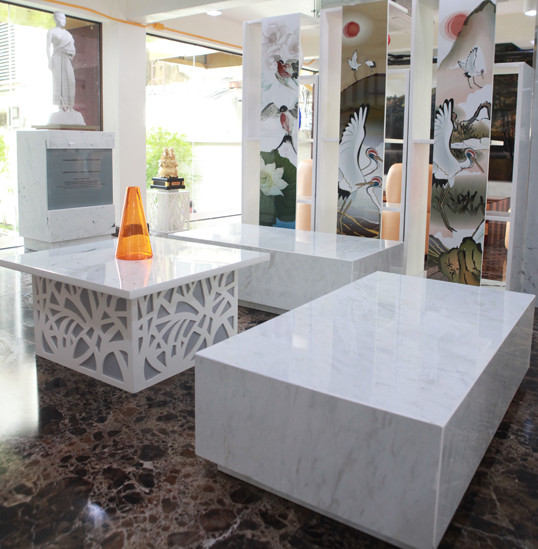
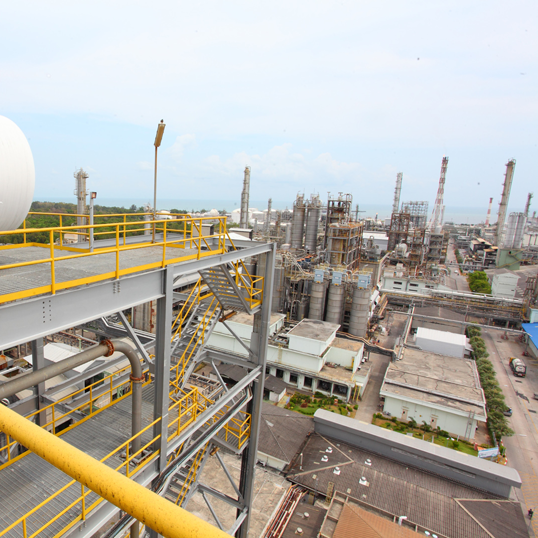
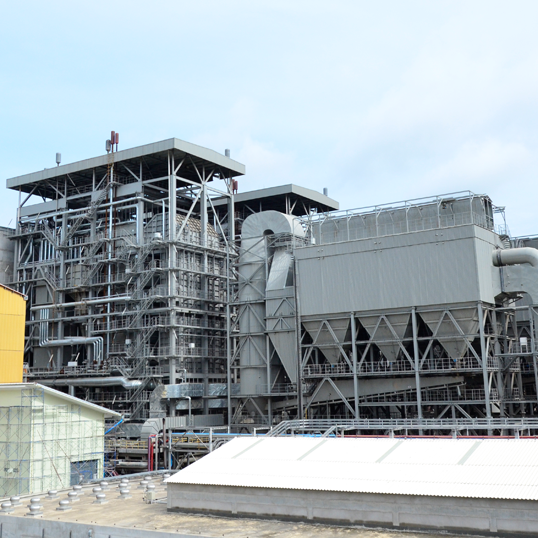
Concrete Roof Tile and Fiber Cement Businesses
The Company has made investments in concrete roof tiles with total project investment of approximately Baht 500 million. This project will be fully operational in 2016. In addition, the Company has made investments in fiber cement projects with total project investment of approximately Baht 3,300 million. The fiber cement project was planned to become fully operational by the end of 2015. These projects have been granted promotional certificates from the Board of Investment (“BOI”).
Concrete Roof Tiles and Fiber Cement Products are classified as one of our products under our logo, “TPIPL”. The Company has a strong commitment to consistently develop the standardization of production processes and quality of the products surpassing the production standards from Thai Industrial Standards Institute and is designed through a production process that uses modern machinery and high technology. Concrete roof tiles and fiber cement products are made from high quality cement and are manufactured to meticulous strength specifications, ensuring endurance and ultimate press. It has captured all the characteristics of creative curb appeal, created a matte appearance and they make a roof stand out. TPI Polene put an emphasis on producing the products to be environmentally friendly and help to even out temperatures.
The Company also developed varieties of products from fiber cement by employing modern “digital technology”. TPI Polene is the very first manufacturer in the country to use digital technology, to create value added to the product and to be used as a substitute for timber fascia, marbled appearance and granite, etc.
Also, the Company also provides a full comprehensive range of design for structure of concrete roof tiles in professional styles. Our superior-quality tiles are available with roofing system, heat-resistant coating and also the budget for installation can be quickly estimated. Our tiles are ideal to complete sustainable building construction, assuring efficient installation work by the professional team under the standardization of roofing material and efficient production process, which can be tested. Our roof system has a large variety of quality products with an attractive appearance and has a comparatively long lifecycle, as well as a highly efficient product development team.
Concrete Roof Tile and Fiber Cement Industry
The major manufacturers in the Concrete Roof Tile and Fiber Cement Industry are Siam Cement Plc, Siam City Cement Plc, Diamond Roofing Tiles Plc., TPI Polene Plc, Siam City Cement Plc., Mahaphant Fiber Cement Plc., and Oranit Roofing Tiles Co., Ltd. Big roofing manufacturers have competitive advantages in terms of controlled cost of production. TPIPL roofing is genuinely produced through research and development for product innovations, the production process that uses modern technology to obtain varieties of products from fiber cement to respond to the needs of new customers, in order to expand the market and capture existing market share.
As there is some limitation of wood properties to be used in decoration or construction work, the fiber cement market has growth potential as they can be used as a substitute for wood. They have better properties as compared with wood, as fiber cement is manufactured to ensure moisture endurance, flexibility, free of termite and insects, cost saving as compared to wood and its availability.
The Company has a policy to export fiber cement products and concrete roof tiles to AEC (ASEAN Economic Community) member countries such as Philippines, Laos and Myanmar and has a plan to expand the market to other countries and other continents, to accommodate economic expansion.
LDPE/EVA plastic resins
In 2015, domestic demand consumption for LDPE/EVA plastic resins slowed down due to falling crude oil prices leading to a sharp drop in LDPE/EVA prices. Most consumers have ceased buying plastic resins owing to swift drop in crude oil prices. In addition, this scavenging of volume markets has slowed, leading to a substantial decrease in demand consumption in commodities during the year as well as a drastic decrease in production output in 2015. Plastic bags manufacturers decided to reduce production output or closed down factories, thereby resulting in a drastic reduction in production volumes of LDPE/EVA in the country.
As for international markets, competitive conditions for LDPE/EVA plastic resins was also intense as there was no sign of economic recovery in Eurozone countries, which caused weaker demand in international markets, particularly a slowdown of imported commodities from the countries in the Eurozone. Simultaneously, there were several manufacturers brought on stream with additional capacity from Korea whereas manufacturers in the Middle East and China produced plastic resins at full capacity, thereby resulting in a drastic reduction in plastic resin prices.
In 2016, the Company anticipates that plastic resin prices will increase in both the domestic market and international market, as there is a sign of economic recovery in the United States of America and in Eurozone countries, which caused strengthen demand in international markets. During the first half of year 2016, it is anticipated that the export market for plastic resins is set to become more stabilized whereas raw material prices will start to reduce accordingly.
For the international market, shale gas in the United States of America was found and explored and there were constructions of additional petrochemical complexes, leading to reduction of gas cost. Thus, petrochemical manufacturers started to produce and export petrochemical products to the international market, which enable it to have an advantage with a lower cost of production in plastic resin. In the country, petrochemical manufacturers primarily use naphtha as the main raw material, which tends to reduce, thereby leading to an improved operational performance of the Company in 2016.
Refuse Derived Fuel (“RDF”) Plant
TPI Polene Power Co., Ltd. (a 99.99% owned- subsidiary of the Company) operates a renewable energy business with an Alternative Fuel Power Plant, or Refuse Derived Fuel (RDF), with a total project investment of Baht 1,200 million. It commenced commercial operations in 2001. The plant is located within the area of our cement plant in Saraburi province. The RDF project enables the Company to use RDF fuel for the partial substitution of coal, thereby reducing our coal usage in the cement production process and/or RDF fuel can be substituted as coal energy to generate energy in the form of electricity in the Plant. The RDF Plant as above has been granted promotion certificates from the Board of Investment (“BOI”).
A Renewal Energy business to enhance recyclable materials not only enables us to reduce coal usage but helps manage waste by reducing the need for conventional waste treatment, such as landfilled waste and dumping grounds. This project also helps reduce environmental impact in the surrounding community and enhance recycling opportunities to further develop a recycling economy with sustainable economic benefits.
Presently, TPI Polene Power is expanding the production capacity for RDF fuel to accommodate its extensive usage as energy fuel for an Alternative Fuel Power Plant, or Refuse Derived Fuel (RDF), with total project investment of Baht 1,450 million with construction to be completed by 2017.
The Company procures three primary types of waste:
- Unsorted landfill waste at the source that the Company manages by itself or through sub-contractors;
- Unsorted MSW consists of unprocessed waste transported to the Company directly from municipal governments and waste management companies without prior sorting. Under this type of waste deposit agreements, TPI Polene Power agrees to pay MSW suppliers a fee, provided that TPI Polene Power is satisfied with the quality of the MSW.
- Pre-sorted MSW transported to the Company by waste management companies to be used as energy fuel for power plants.
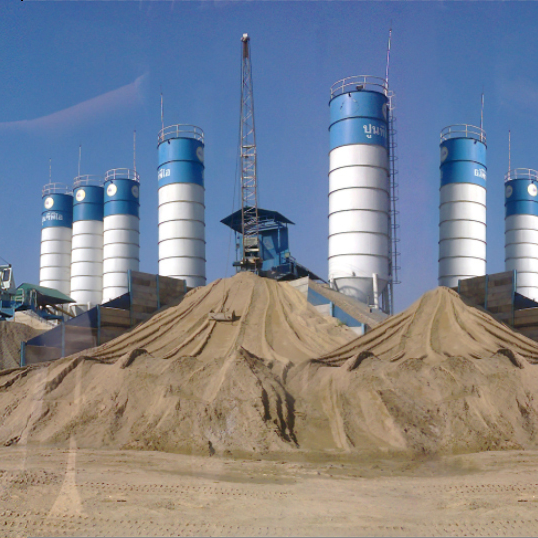
Ready-mixed Concrete
TPI Concrete Co., Ltd. Manufacture (a 99.9% owned subsidiary company) is the second largest manufacturer and distributor of ready-mixed concrete with a market share of 13% of ready-mixed concrete demand in the country. Product quality and consistent improvement of service is our prominent feature.
The major competitors of TPI Concrete are Concrete Product and Aggregate Co., Ltd. (CPAC),
Siam City Concrete Co., Ltd. and Asia Concrete Products Co., Ltd. There are also several other minor concrete manufacturers in the country.
Ready-mixed Concrete Industry
The ready-mixed concrete industry slowed down in the first half of 2015, mainly due to the delay in government infrastructure projects and private construction projects which was a direct result of an economic slowdown in the country and lower purchasing power in the country caused by the drop of agricultural products prices while housing debt has climbed relatively high. However, demand for concrete in the country showed signs of recovery, a result of investment in construction sectors and the acceleration of the disbursement of national budgets from the government and state enterprise funds, to further drive the increase of property development of the country’s infrastructure projects, whereas investment in private sector’s investment scheme showed signs of shrinking, leading to the decrease in overall demand consumption of ready-mixed concrete in the country in 2015 compared to the previous year.
In 2016, it is anticipated that the construction situation will tend to improve, supported by an expedited disbursement of national budgets, particularly the investment fund for extension of the sky train’s line routes to cover all areas in Bangkok and its outskirts in parallel with the Government’s investment of infrastructure projects for the logistics system, which includes construction of double track railways throughout Thailand and an additional three routes of motorway construction project. These projects are in response to the opening of AEC (ASEAN Economic Community) and to further drive property development from the private sector and foreign investment, particularly increased investment in construction of residential housing, which is anticipated to expand to be in line with infrastructure development plans.
Light Weight Concrete
The Company made investments in its Lightweight Concrete Project, with total investment of approximately Baht 800 million. This project became commercially operational in 2015. Demand consumption for lightweight concrete consistently grows, which was fueled by the acceleration of some massive infrastructure projects in those countries. As a result of which, lightweight concrete is now being used in an ever-increasing number of applications and it is a material suitable for a wide range of purposes, as well as achieving cost savings through construction speed and lower labor costs. Therefore, lightweight concrete can respond to the demand in the construction market, driving the market for lightweight concrete to expand rapidly. Lightweight concrete can be used for ready-made board with strengths equivalent to normal lightweight concrete. The dominant characteristic of the lightweight concrete project is that the Company can produce lightweight concrete using a variety of raw material produced at its own plant, which is greater than 90%, which include electricity and surplus of steam which will be reusable in the production process, thereby resulting in lower costs of production and creating competitive advantages.
Pyrolysis Plant
The Company operates modern, high-efficiency energy recovery technology using a Pyrolysis Plant, with total project investment of Baht 652 million. The pyrolysis plant is designed to generate crude oil and liquid fuel from waste plastic and tire pyrolysis. The project is operated adjacent to the RDF plant, which is located within the area of our cement plant in Saraburi province. The Pyrolysis Plant has been granted promotion certificates from the Board of Investment (“BOI”). The crude oil and liquid fuel will be used as energy power for truck transports of raw material in the cement production process, which enables the Company to reduce energy costs. Presently, the Company can produce crude oil to be used with the mixture of diesel fuel of approximately 3 million liters per year as power for truck transports of the Company. TPI Polene has a plan to enhance efficiency of crude oil production by setting the target of production output to be at 3 million liters per year.
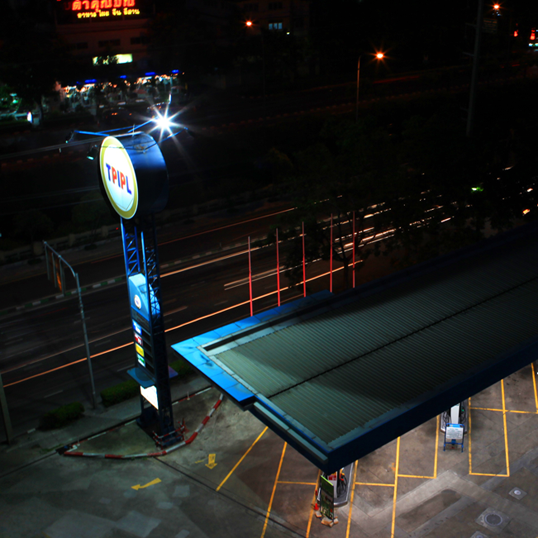
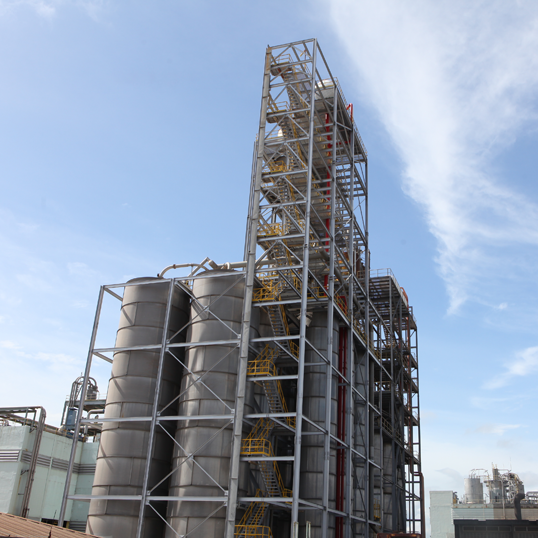
Petrol Service Stations and NGV gas stations
Fertilizer Plant
In 2016, it is anticipated that the agricultural economy will expand at the growth rate of 2.5-3.5%, thereby helping increase sales quantity and enhance better operational performance.
Organic Fertilizer Industry
In 2015, organic fertilizers in Thailand started to move in a good direction, driven mainly by private sector and civil society. TPI Polene Bio Organics Co., Ltd. is the manufacturer and distributor of high quality organic fertilizer and the fertilizers have been received a good response from customers in both Thailand and the international market.
Ammonium Nitrate and Nitric Acid
Thai Nitrate Co., Ltd. (50% owned by TPI Polene, as it appears in the list of shareholders of the Company - Bor Or Jor 5 - at the Department of Business Development, Ministry of Commerce, detailed in the 2015 financial statements, item 40), is the largest producer of ammonium nitrate and nitric acid in the country and Thai Nitrate is the sole producer of nitric acid in Thailand.
TPIPL Drinking Water Business
TPI Polene has operated a drinking water business under the brand name “TPIPL” since 2011. It has good quality products and it is safe for consumers as it uses high quality reverse osmosis technology filtration systems (RO). This process requires that high pressure be exerted on the high concentration side of the membrane and by applying ultra violet treatment to eliminate biological contamination and the ozone treatment process in the water-bottling stage of the production of drinking water. These major benefits have made TPIPL drinking water possess quality characteristics of water; thus, we obtained a certificate approved from the Food and Drug Administration (FDA) in compliance with the standards from natural resources. TPIPL drinking water is consumed at the plants and head office and is also distributed to consumers.
Industrial Waste Disposal Business
TPI Polene also operates an industrial waste disposal business to dispose of industrial waste from various industries in the country, under a license to operate a central waste treatment plant granted by Department of Industrial Works. This project helps eliminate industrial waste from industries, enhance recycling opportunities, lower raw material and fossil fuel usage, and develop a recycling economy with the preservation of environmental surroundings.
Petroleum Exploration and Production Technology
TPI Polene Power Co., Ltd. (99.99%-owned subsidiary) entered the Petroleum Concession no. 2/2554/110 for concession block no. L29/50 with the Ministry of Energy on February 8, 2011, as the concessionaire for Petroleum Exploration and Production Technology. Presently, the Company is in the process of petroleum exploration on the concession reserve.
In addition, the Company has invested in other businesses through its subsidiaries and affiliated companies, and is involved in real estate development, the provision of life insurance services, and the manufacture and sale of packing bags, etc.




